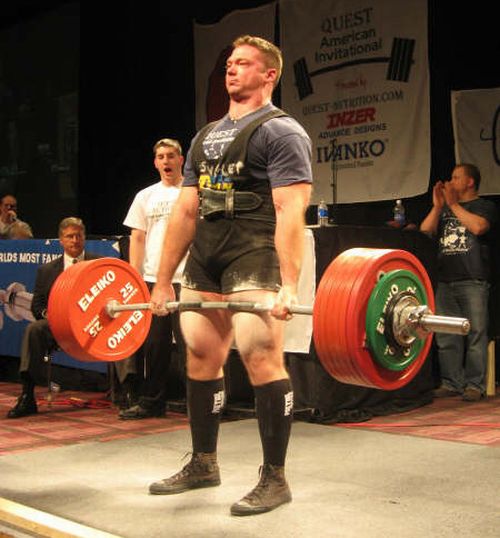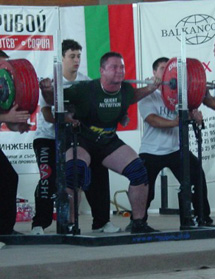CNS Help
by Mike Tuchscherer

Adam was a friend of mine. He had been training for months for this lift. Now, a PR was finally loaded on the squat bar. Call it leverages. Call it whatever. Squat PRs are few and far between for him.
His buddies were all around him, yelling for him to, "Crush it!" and to "Bury this one, Adam!"
Seriously, the atmosphere was pretty awesome. Even though I was trying to just sit back and observe what was happening, I couldn't help but get a little amped up for the guy.
The unrack and walkout was perfect. His set up was spot-on. He looked very strong and I remember being happy for him and just being sure he was going to slam this weight.
But he didn't. In fact, he got stapled. Lucky for him, he had some competent spotters, because he sure didn't have the safety pins set properly. Then after he dusted himself off he said something I had heard a hundred times, but this time it got stuck in my head like a chicken bone stuck in a dog's throat.
"My CNS is just shot."
For those who may not know, the CNS is the Central Nervous System. It's what sends the signal from the brain to the muscles saying, "Contract!" Somewhere over the last several years, we have got to where we blame almost every missed lift on either a technique failure or a "shot CNS".
In the beta tests for TRAC, I have discovered that true CNS degradation, although not rare, is certainly less common than we sometimes think. Once TRAC comes online in a few months, you will be able to tell if your CNS really is shot or if it is something else.

One way or another, CNS output does fluctuate from day to day. And although it's not as common as some may think to have a "shot CNS," some days are certainly better than others. So what do you do if you're having a day where you suspect your CNS isn't operating as well as it could?
The first thing I would suggest is ensure you're getting enough quality sleep. Sleep is a big mystery of varying degrees to all of us. Though sleep science has come a long way, there's still a lot we don't understand about sleep. That said some of the leading theories shed some important light on the matter.
If you look at a graph a full sleep cycle in a healthy individual, you will see that they quickly fall into REM sleep, a relatively light sleep stage. Then they progress to the deeper stages of sleep - eventually into Stage IV sleep. As morning starts to draw near, the sleep cycle lightens again, until you have a substantial amount of REM sleep again before waking.
Where this gets interesting is the theory that mental processes are refreshed during REM sleep and physical healing is accelerated during Stage IV sleep. If you look at it from a CNS support perspective, you need plenty of REM sleep to function your best - this means a full sleep cycle.
Some things you can do to ensure a full sleep cycle are making sure the room is cool, extremely dark, and void of startling noises. This usually means running a fan (helps keep things cool and covers odd noises).
CNS functioning can also be aided nutritionally. Ensuring you have adequate amounts of the proper vitamins and minerals can go a long way in aiding CNS functioning. B-Vitamins, sodium, calcium, and potassium all play a role in proper nervous system functioning to one degree or another.
Acetyl-L-Carnitine, such as that found in Amplifier, can make a very big difference in CNS functioning. It has shown improved cognition (the ability to think) as well as being a precursor to Acetylcholine, a neurotransmitter that is active in all branches of the nervous system. Having adequate amounts of Acetylcholine is critical to optimum functioning of the nervous system. A product like Amplifier provides a lot more than just Acetyl-L-Carnitine. For more information on how Amplifier works, check out the product information.
Another way to help CNS recovery is simply to rest. Relaxation that requires low amounts of visual-motor stimulation can help your CNS "unwind" so to speak. Think of this like a quiet evening of reading a book rather than attending a heavy metal concert. Though I can't fault you for going to said concert, it may not be the best for your CNS restoration program!
So if you think you're one of the guys whose CNS is "shot", try these tips and see the difference they can make. Even if you're just a hard trainer and you don't necessarily think your CNS is overtrained, these tips can still benefit you. Training still affects us and although true cases where the CNS can't recover are somewhat rare, fluctuations in functioning do happen, so it's worthwhile to give yourself the maximum amount of support possible.
Mike Tuchscherer is the owner of Reactive Training Systems, a company dedicated to individualized physical training. The goal of RTS is to help you become a dominant force in your sport! Learn more by visiting www.ReactiveTrainingSystems.com.
Mike himself is an accomplished Powerlifter. He has over 12 years of experience training and researching the best training methods in the world. Mike has competed in raw and single ply competitions. He recently won the Gold medal representing the USA at the 2009 World Games; becoming the first American male to ever win this distinction. His best lifts in IPF competition are a 903 squat, a 644 bench press, an 826 deadlift, and a 2342 total in the 275 pound weight class.
More Articles By Mike Tuchscherer
Return to the Workout Articles Archive
|